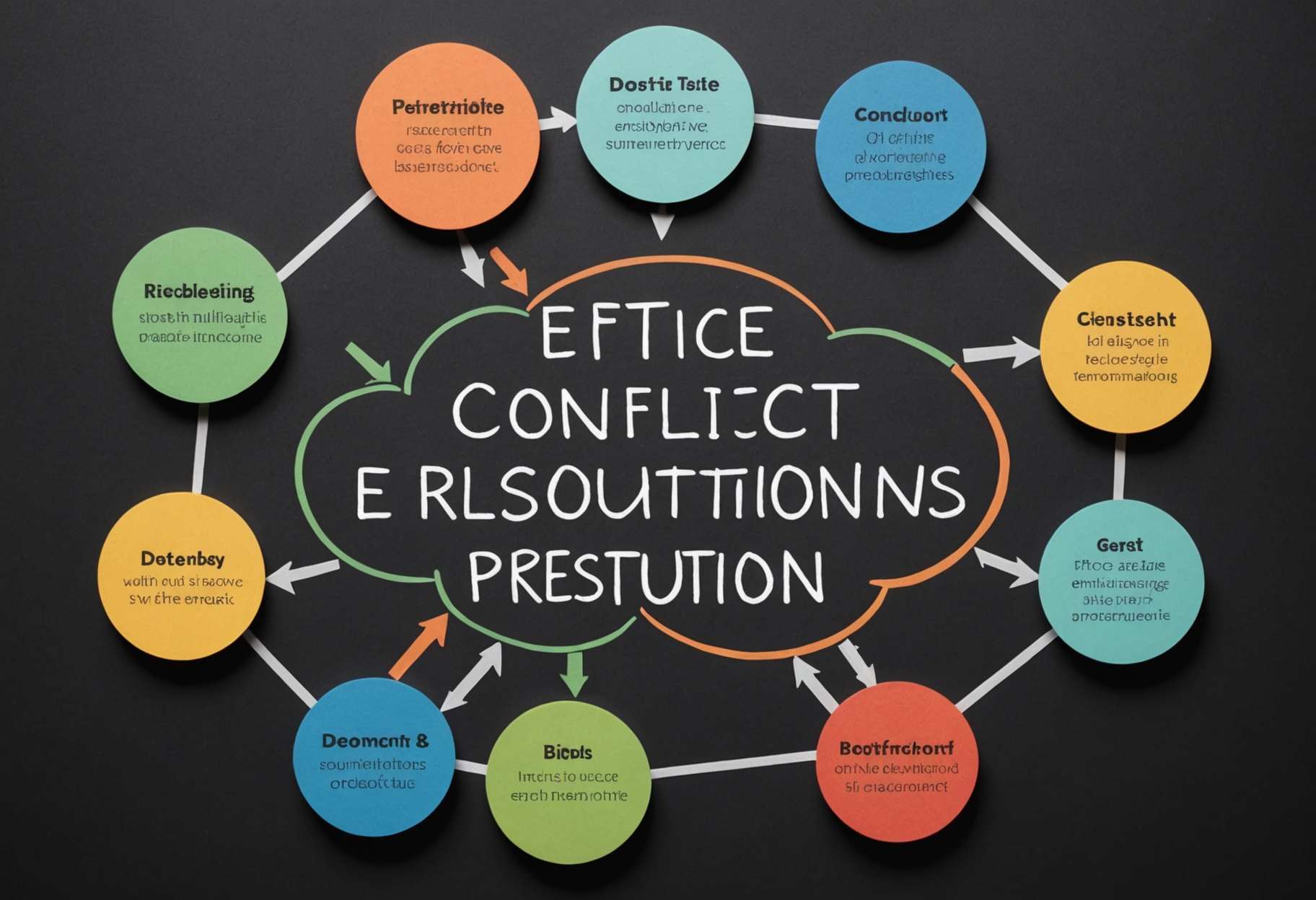Understanding Successful Compromise Standards to Cultivate Agreeable Connections

Struggle is an inborn part of human connections, spreading over from gentle conflicts to serious debates that might bring about delayed hatred. In any case, whenever oversaw fittingly, clashes can act as impetuses for self-awareness, more profound connections, and improved understanding. Viable compromise is fundamental for exploring these circumstances, guaranteeing that connections \x1 whether individual or expert \x1 are saved as well as braced. This article investigates the key standards of powerful compromise that cultivate amicable connections.
Grasping the Idea of Contention
Struggle rises out of differences in values, inspirations, discernments, thoughts, or wants. While certain distinctions might appear to be paltry, clashes can escalate and turn out to be more difficult to determine when they include huge qualities or profound feelings. The American Administration Affiliation reports that associations lose up to $359 billion every year in paid hours, comparable to 385 million working days, because of contention. This measurement features the significant effect clashes can have on execution, underlining the need for viable compromise systems.
Key Standards of Compromise
Changing struggle from a harming force into a helpful one depends on a few critical standards of viable compromise. Probably the most fundamental include:
1. Open Correspondence: It is vital for Cultivate transparent exchange. This involves effectively paying attention to the next party and completely fathoming their point of view prior to answering. As per CPP Inc's. report \Working environment Struggle and How Organizations Can Tackle It to Flourish,\ roughly 70% of contentions emerge from unfortunate correspondence. By improving relational abilities, gatherings can fundamentally decrease false impressions and misinterpretations that lead to clashes.
2. Compassion: Sympathy includes understanding and really esteeming someone else's perspective and sentiments. This guideline requires looking past one's point of view to see the value in the close to home and mental position of the other party. Developing sympathy prompts further comprehension and regard, which can actually alleviate pressures.
3. Center around Interests, Not Positions: The Harvard Technique for Exchange recommends that effective compromise depends on distinguishing basic interests as opposed to participating in positional haggling. Frequently, parties in struggle focus on their position without thinking about the more deeply inspirations that illuminate their positions. By perceiving these interests, gatherings can recognize shared belief and arrive at arrangements that fulfill all interested parties.
4. Produce Choices Prior to Choosing: Cooperatively conceptualizing potential arrangements can invigorate collaboration and produce innovative results that one-sided choices might neglect. It is fundamental for all gatherings to contribute thoughts, as this comprehensive strategy improves the probability of an enduring understanding and advances a common feeling of pride over the goal cycle and its outcomes.
5. Go for the gold: Compromise shouldn't bring about clear victors and failures. The best goals are those wherein all gatherings feel they have acquired something. When reasonable, take a stab at results that give shared benefits, in this way cultivating generosity and improving long haul connections.
Executing Compromise in Day to day existence
To apply these standards really, perceiving the fitting opportunity to address a contention is significant. Timing can altogether impact the goal interaction; tending to worries too soon or past the point of no return can compound struggles or entangle their goal. Moreover, creating the ability to appreciate individuals on a profound level is crucial \x1 it works on one's ability to perceive and oversee their feelings as well as those of others. Preparing projects and studios can act as successful instruments for improving these abilities, as indicated by the General public for Human Asset The board, which recognizes correspondence and exchange as top improvement needs for workers.
End:
Embracing compelling compromise standards is basic for sustaining amicable connections. By underlining open correspondence, sympathy, an emphasis on interests over positions, cooperative critical thinking, and looking for mutual benefit results, people and associations can determine clashes all the more productively and keep many issues from heightening. Executing these methodologies can encourage more useful, manageable, and agreeable relational and proficient conditions. Eventually, the target of compromise ought to constantly be to build spans instead of erect hindrances. Dominating compromise can essentially improve individual connections and expert settings, adding to more prominent generally speaking fulfillment and achievement.
Grasping the Idea of Contention
Struggle rises out of differences in values, inspirations, discernments, thoughts, or wants. While certain distinctions might appear to be paltry, clashes can escalate and turn out to be more difficult to determine when they include huge qualities or profound feelings. The American Administration Affiliation reports that associations lose up to $359 billion every year in paid hours, comparable to 385 million working days, because of contention. This measurement features the significant effect clashes can have on execution, underlining the need for viable compromise systems.
Key Standards of Compromise
Changing struggle from a harming force into a helpful one depends on a few critical standards of viable compromise. Probably the most fundamental include:
1. Open Correspondence: It is vital for Cultivate transparent exchange. This involves effectively paying attention to the next party and completely fathoming their point of view prior to answering. As per CPP Inc's. report \Working environment Struggle and How Organizations Can Tackle It to Flourish,\ roughly 70% of contentions emerge from unfortunate correspondence. By improving relational abilities, gatherings can fundamentally decrease false impressions and misinterpretations that lead to clashes.
2. Compassion: Sympathy includes understanding and really esteeming someone else's perspective and sentiments. This guideline requires looking past one's point of view to see the value in the close to home and mental position of the other party. Developing sympathy prompts further comprehension and regard, which can actually alleviate pressures.
3. Center around Interests, Not Positions: The Harvard Technique for Exchange recommends that effective compromise depends on distinguishing basic interests as opposed to participating in positional haggling. Frequently, parties in struggle focus on their position without thinking about the more deeply inspirations that illuminate their positions. By perceiving these interests, gatherings can recognize shared belief and arrive at arrangements that fulfill all interested parties.
4. Produce Choices Prior to Choosing: Cooperatively conceptualizing potential arrangements can invigorate collaboration and produce innovative results that one-sided choices might neglect. It is fundamental for all gatherings to contribute thoughts, as this comprehensive strategy improves the probability of an enduring understanding and advances a common feeling of pride over the goal cycle and its outcomes.
5. Go for the gold: Compromise shouldn't bring about clear victors and failures. The best goals are those wherein all gatherings feel they have acquired something. When reasonable, take a stab at results that give shared benefits, in this way cultivating generosity and improving long haul connections.
Executing Compromise in Day to day existence
To apply these standards really, perceiving the fitting opportunity to address a contention is significant. Timing can altogether impact the goal interaction; tending to worries too soon or past the point of no return can compound struggles or entangle their goal. Moreover, creating the ability to appreciate individuals on a profound level is crucial \x1 it works on one's ability to perceive and oversee their feelings as well as those of others. Preparing projects and studios can act as successful instruments for improving these abilities, as indicated by the General public for Human Asset The board, which recognizes correspondence and exchange as top improvement needs for workers.
End:
Embracing compelling compromise standards is basic for sustaining amicable connections. By underlining open correspondence, sympathy, an emphasis on interests over positions, cooperative critical thinking, and looking for mutual benefit results, people and associations can determine clashes all the more productively and keep many issues from heightening. Executing these methodologies can encourage more useful, manageable, and agreeable relational and proficient conditions. Eventually, the target of compromise ought to constantly be to build spans instead of erect hindrances. Dominating compromise can essentially improve individual connections and expert settings, adding to more prominent generally speaking fulfillment and achievement.
LATEST POSTS
- 1
 Presenting Nintendo's New Pastel Euphoria Con Tones for Switch Gamers: 3 Trendy Choices
Presenting Nintendo's New Pastel Euphoria Con Tones for Switch Gamers: 3 Trendy Choices - 2
 The most effective method to Decide the Best Auto Crash Attorney for Your Lawful Necessities
The most effective method to Decide the Best Auto Crash Attorney for Your Lawful Necessities - 3
 10 High priority Contraptions for Tech Aficionados
10 High priority Contraptions for Tech Aficionados - 4
 Rediscovering Experience Through Excursions: Individual Travel Stories
Rediscovering Experience Through Excursions: Individual Travel Stories - 5
 Survey: Protected And Versatile Men's Razor
Survey: Protected And Versatile Men's Razor
Share this article
 Figure out How to Upgrade Your Gold Speculation Portfolio: Vital Bits of knowledge and Strategies
Figure out How to Upgrade Your Gold Speculation Portfolio: Vital Bits of knowledge and Strategies Home Security Frameworks with Shrewd Elements
Home Security Frameworks with Shrewd Elements 7 Powerful Techniques to Boost Efficiency with Your Cell Phone: A Thorough Aide
7 Powerful Techniques to Boost Efficiency with Your Cell Phone: A Thorough Aide Manual for Tracking down the Nearby Business sectors and Marketplaces
Manual for Tracking down the Nearby Business sectors and Marketplaces Wedding trip Objections in the US
Wedding trip Objections in the US 2024 Moving Styles for Kitchen Redesigns
2024 Moving Styles for Kitchen Redesigns All that You Really want to Be aware of Dental Inserts Facilities
All that You Really want to Be aware of Dental Inserts Facilities Figure out How to Pick a SUV with Senior-Accommodating Tech Elements
Figure out How to Pick a SUV with Senior-Accommodating Tech Elements 6 Solid Vehicle Fix Administrations to Keep Your Vehicle in Prime Condition
6 Solid Vehicle Fix Administrations to Keep Your Vehicle in Prime Condition













